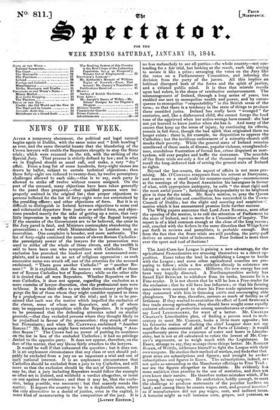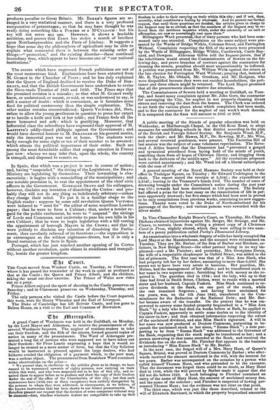The Anti-Corn-law League is gaining a new advantage, for the-
agricultural Protectionists are arousing themselves to a direct op- position. Essex takes the lead in estatilishing a League to battle with the League ; and some other, agricultural counties are pre- paring to follow ; while a few sotieties already in existence are taking a more decisive course. Hitherto, the new energy has not been very happily directed. A Northamptonshire society has forced Earl SPENCER to withdraw from its ranks, because he is a Free-trader. It is not shown that he will be less a Free-trader for the exclusion ; that he will have leas influence ; or that his farming associates were assumed to share his Free-trade opinions because they consorted with him in fattening "cattle and encouraging able ploughmen. The step, therefore, savours as much of futility as of littleness. If they wanted to neutralize the effect of Lord SPENCER'S free trade among agriculture, they should have sought some equally eminent advocate of protection among manufactures or commerce— say Lord LONDONDERRY, for want of a better. Mr. CHARLES CHAPLIN'S Lincolnshire plan, of finding a person used to mob- oratory to meet Mr. CORDER, looks a little more apposite ; but his favourite notion of ducking the chief Leaguer does not say. much for the controversial skill of the Parts of Lindsey : it would, superfluously prove the existence of water and boors in Lincoln- shire, but is not at all calculated to refute the lowest of Mr. Cos- DEN'S arguments, or to weigh much with the Legislature. In Essex, strange to say, they manage these things better. Mr. ROBERT KER, of Writtle, addresses himself to fight the League with their own weapons. He studies their method of warfare, and finds that thei great arms are subscriptions and figures; and straight he evoker subscriptions and figures in Essex. The subscriptions, indeed, art not quite so astounding as the Manchester offerings to Free Tract nor are the figures altogether so formidable. He evidently hut more ambition than practice in the use of statistics, and does not even know their nature. He therefore makes mistakes which, if he is young, he may outgrow. He undertakes, boldly enough, to meet the challenge to produce statements of the peculiar hardens on land ;.and among them he counts wages, rent, and general taxation! as if manufacturers did not pay wages, rent, and indirect taxa: A botanist might as well instance corn, grapes, •and potatoes,
products peculiar to Great Britain. Mr. BAKER'S figures are ar- ranged in a very statistical manner, and there is a very profound computation of percentages; so that he may have thought he was really doing something like a PORTER or a M`CuLx.oca : but his toy will not serve any use. However, it shows a laudable ambition, and proves that Essex has stolen a march of intellect upon Northamptonshire and the Parts of Lindsey. It suggests a hope that some day the philosophers of agriculture may be able to explain what connexion there is between the existing order of things—" protection," and the existing disorder—these continual incendiary tires, which appear to have become one of "our national institutions."



























